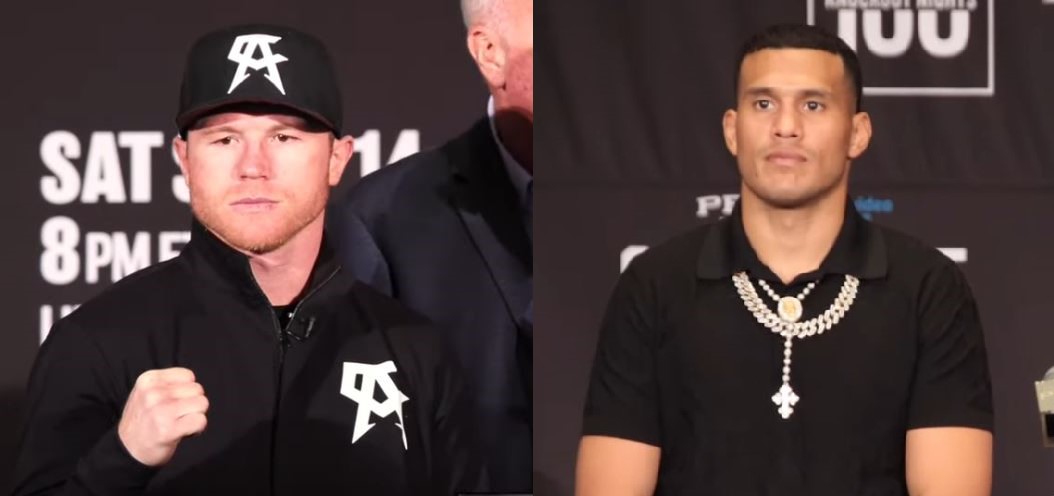
In the world of boxing, few matchups generate as much buzz as those involving the sport’s top fighters. Among the most talked-about is the potential bout between Mexican superstar and current unified super middleweight champion Saul “Canelo” Alvarez (62-2-2, 39 KOs) and undefeated former super middleweight champ David Benavidez (29-0, 24 KOs).
Both fighters have established themselves as elite in the 168 lbs division, and a clash between them would undoubtedly be a highly anticipated event that would do big numbers at the Pay-Per-View box office. However, recent discussions have surfaced regarding Canelo Alvarez allegedly “ducking” David Benavidez. This article delves into the nuances of this debate, exploring the factors influencing the matchup and the implications for both fighters.
The Background
Saul “Canelo” Alvarez, a multiple-weight world champion, winning titles from 154 lbs to 175 lbs, has long been regarded as one of boxing’s premier talents and top draws. His impressive resume includes victories over notable opponents such as Gennady Golovkin, Sergey Kovalev, Caleb Plant, Jermell Charlo, Jaime Munguía and most recently Edgar Berlanga . On the other hand, David Benavidez, known for his explosive power and aggressive style, has quickly risen through the ranks, amassing an impressive record and gaining a reputation as a “Monster” in the super middleweight and light heavyweight divisions.
The term “ducking” in boxing refers to a situation where a top fighter is perceived to be avoiding a matchup with a dangerous opponent, often for strategic or financial reasons. For example, a segment of boxing fans claimed Floyd Mayweather Jr. ducked Manny Pacquiao for fear of facing him in his prime, and only fought him when he was knocked out or lost a step. In this context, accusations of Canelo Alvarez ducking David Benavidez have been a topic of heated debate among fans and analysts.
The Claims
Critics argue that Alvarez’s reluctance to face Benavidez stems from several factors:
Risk vs. Reward: Benavidez poses a significant threat with his power and aggressive fighting style. For Canelo, taking on Benavidez could be seen as a high-risk, low-reward scenario, especially considering the financial and reputational stakes involved. Benavidez could also give Canelo one of his toughest fights, he has high punch rate, good stamina, and fast punches in bunches.
Strategic Moves: Some suggest that Alvarez’s team is carefully selecting opponents to maximize financial gains and minimize risks. By avoiding a dangerous opponent like Benavidez, Alvarez might be focusing on bouts that are perceived as less challenging but potentially more lucrative.
Weight Class Dynamics: Alvarez has moved through various weight classes, often changing his focus based on his comfort and strategic goals. Benavidez, primarily a super middleweight but moved up to light heavyweight, represents a different challenge, and the weight class dynamics might influence Alvarez’s decision-making. Benavidez is young and in his prime, he also has the size and reach over Canelo.
Counterarguments
On the flip side, there are several reasons to consider that Alvarez might not be intentionally avoiding Benavidez:
Fighter Schedule and Sanctioning Body Mandatories: Boxing schedules are complex, and Alvarez has been involved in high-profile matches with other opponents. It’s possible that scheduling conflicts or existing commitments could have delayed or complicated the potential fight with Benavidez. Also, Canelo hold several titles and he has mandatory challengers for each body in order to maintain his titles.
Negotiation Hurdles: Matchmaking in boxing involves numerous negotiations, including financial terms, venue selection, and promotional considerations. Disagreements in these areas can lead to delays or cancellations of proposed bouts. Benavidez would be making the most money of his career, and since the fight is high risk for Canelo he would need a lucrative payday, hence why he demanded 200 million, he has already fought the best and solidified a hall of fame worthy resume, so he really doesn’t need Benavidez who currently holds no titles other than for financial reasoning.
Respect for Opponents: Alvarez has consistently demonstrated a willingness to take on tough challenges throughout his career. The notion that he would specifically avoid Benavidez undermines his reputation as a fighter who is unafraid to face the best in the sport.
The Future of the Matchup
The ongoing speculation surrounding this potential bout highlights the broader dynamics of boxing matchmaking and why so many super fights either never happen or come too late because of two egos clashing. Fans and analysts alike are eager to see how this situation will evolve but won’t hold their breath. Will Alvarez eventually step into the ring with Benavidez? Or will the challenges and negotiations continue to delay this highly anticipated fight?
In the end, the discussion about Canelo Alvarez ducking David Benavidez underscores the complexities of boxing as a sport and a business. While it’s natural for fans to speculate and analyze, it’s important to consider all the factors at play before arriving at conclusions or accusing one side of avoiding the other out of fear. The potential fight between Alvarez and Benavidez remains one of the most most demanded super fights in boxing, and only time will tell if it will become a reality.